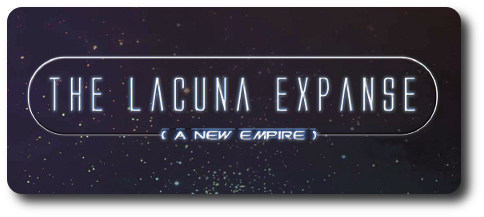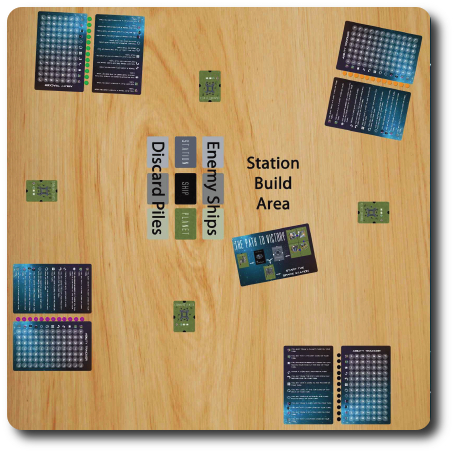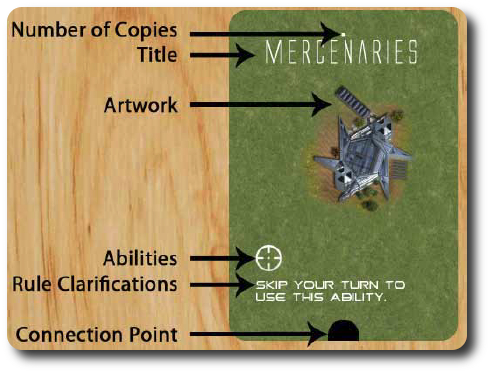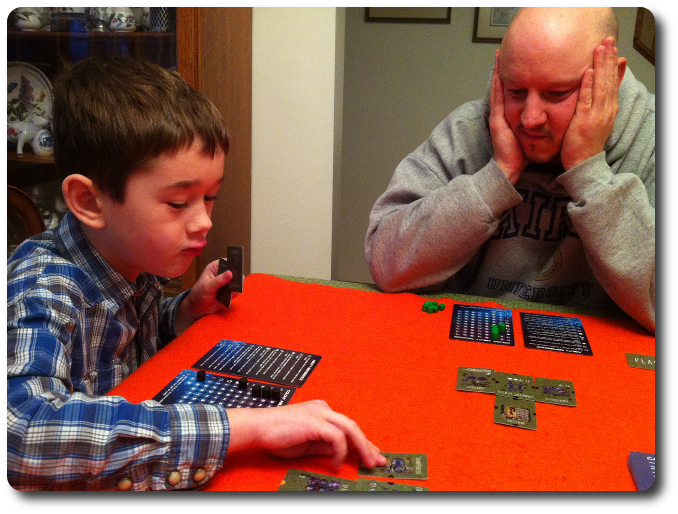
The Basics:
- For ages 8 and up (publisher suggests 12+)
- For 1 to 4 players
- Variable game length (60 to 90 minutes)
Geek Skills:
- Active Listening & Communication
- Counting & Math
- Logical & Critical Decision Making
- Reading
- Pattern/Color Matching
- Strategy & Tactics
- Risk vs. Reward
- Cooperative & Team Play
- Hand/Resource Management
Learning Curve:
- Child – Easy
- Adult – Easy
Theme & Narrative:
- Cooperatively build on a remote planet to secure a foothold and a new home for the human race.
Endorsements:
- Gamer Geek approved!
- Parent Geek approved!
- Child Geek approved!
Overview
It is known as the Lacuna Expanse, a vast stretch of stars and inhabitable planets rich with resources. Like settlers and explorers of old, we took to the stars and made our way to this new frontier. What we found was all that we had hoped and dreamed for, but we were not the first to arrive. It is unclear who we are fighting, but we know we are not alone or welcome in this small corner of the galaxy.
The Lacuna Expanse: A New Empire, a self-published game by JT Smith (one of the three founders of the Game Crafter), is comprised of 44 wooden Tracker cylinders (in 4 different colors, 11 of each), 1 Path to Victory reference card, 4 Ability Reference cards, 4 Ability Tracker cards, 97 Planet cards, 32 Ship cards, and 18 Station cards. The cards are roughly half the size of a standard playing card. The artwork is right in line with the game’s theme and very closely matches the computer graphics found in the online game from which it is based. The Tracker cylinders are made of solid wood and the rest of the game components are made of firm card stock.
Game Set Up
Setting up the game is fast and easy, especially if you are like me and organize all your game components into little bags. The game comes pretty much ready to play right out of the box with the owner of the game only needing to separate the cards, which as it happens, is the first step in the set up. Note that the game will require a good amount of table space to play, especially if you are playing with 3 or more players. Make sure every player has enough room to build their colony and there is a reserved space in the middle of the playing area to build the space station.
First, separate the Planet, Ship, and Station cards into three decks by card type. Each card type has a labeled card back making this a simple exercise. Remove the 4 Command Center Cards from the Planet deck and give one to each player, removing from the game any that are not used. Each player should place their Command Center Planet card in front of them with the text of the card at top. Shuffle all three decks and place them in the center of the playing area in a straight line, face-down.
Second, give each player 1 Ability Reference card and 1 Ability Tracker card. Each player should take all the Tracker cylinders of one color. On the Ability Tracker card, players will place one Tracker cylinder on each of the red circle spaces. The rest of the Tracker cylinders should remain off to one side of the player’s Ability Tracker card.
Third, place the Path to Victory reference card on the table where all players can easily see it. When done, your set up should look something like the following.

That’s it for game set up! Time to start building your colonies and establishing the human empire on a new world!
How to Build a Colony
Most (not all) of the Planet cards will have a specific “module” that must be attached in a chain to your colony to work. Everything starts from the player’s Command Center Planet card and from there the player branches off. Each card will have one or more half-circles on one or more of the card’s four sides referred to as connection points. Additionally, these half-circles could be black, orange, purple, or blue. To build one card off another (referred to as playing a Planet card), the player must be able to match all the half-circles (including the correct color) to any other card it is next to. The card must also be orientated correctly with the card’s title at top. Just about every card in the game has small “pips” (dots) that are next to each of the card’s titles to let the players know how many of that specific card are available. Very useful when you are considering trading and giving cards to other players or evaluating the threat of an enemy ship.

When a player successfully builds to their colony, whatever ability the card provides (matched by the icons) increases the player’s total number of times they can use that ability on their turn. This is tracked on the player’s Ability tracker card. Likewise, if a card is removed by the player, whatever ability the card provided is automatically reduced by the number of icons on that card on the Ability Tracker. When cards are removed from the colony, they must not isolate any of the other cards currently built. For example, a card cannot be removed that splits the player’s colony in two or more. A player must always be able to “walk” from their Command Center Planet card to any other Planet card. Additionally, players cannot combine their colonies.
Playing the Game
The game is played in rounds with each player taking a single turn during the round. What a player can do on their turn is dependent on what structures they have built in their colony. This means that every player will have slightly different abilities as the game progresses. As this is a cooperative game, players should feel free to talk to each other and strategize what cards they should play to ensure that they are building as efficiently as possible. However, players can never show their cards in their hand to each other.
By default, each player will always have no less than 2 abilities and a maximum hand size of 2 cards. These are given to the player via their Command Center Planet card. As the game progresses, the number and type of abilities will fluctuate. On a player’s turn, they can take their actions and abilities in any order they choose or they can demolish one structure in their colony. The very last thing a player will do on their turn is discard down to their hand size as noted on their Ability Tracker card.
A number value next to each action and ability indicates how many times the player can use that action or ability on their turn, which is tracked by the Tracker cylinders and coincides with the cards the player has in their colony. A card in the colony might not include an ability icon, might include more than one, and might also include additional rules to use it. As such, players will not only need to keep their Ability Tracker updated to reflect their overall colony, but must also be aware of any additional rules or restrictions a card provides. This is not as complicated as it might sound as each player will be custom building their own colony and will know exactly what each card does.
![]()
In general, the cards in a player’s colony will provide the following abilities, which we have summarized here, and can be taken in any order on the player’s turn.
Draw Planet Card
By default, all players can always draw a Planet card on their turn. This card is drawn from the face-down Planet deck. Unless the card says otherwise, it is placed in the player’s hand once drawn.
Play Planet Card
By default, all players can play a Planet card from their hand.
Maximum Card Hand
By default, all players can hold 2 or fewer cards in their hand. At the end of their turn, the player must discard down to this ability’s value.
Trade Card
This ability allows the player to trade cards with another player.
Take Discarded Card
This ability allows the player to select the top card from any discard pile.
Give a Card
This ability allows the player to simply give (not trade) a card from their hand to any player on their turn.
Look at Top Card
This ability allows the player to look at the top card on any face-down deck on their turn.
Shuffle Enemy Card
This ability allows the player to shuffle an enemy Ship card into the deck it came from.
Draw a Ship Card
This ability allows the player to draw a Ship card on their turn. This card is drawn from the face-down Ship deck. Unless the card says otherwise, it is placed in the player’s hand once drawn.
Play a Ship Card
This ability allows the player to play a Ship card.
Draw a Station Card
This ability allows the player to draw a Station card on their turn. This card is drawn from the face-down Station deck. Unless the card says otherwise, it is placed in the player’s hand once drawn.
Play a Station Card
This ability allows the player to play a Station card, which is necessary to win the game.
Enemy and Friends Above!
As the game progresses, enemy ships will emerge. They can come from the Planet, the Ship, and the Station decks. These are negative cards and thematically represent a growing threat to the players. The longer they are on the planet and building their colony, the more attention they are attracting. But there are also friendly ships. To make this very obvious to the player when they draw a ship, the title of the card will say “Enemy” if it is a negative card. These are played ABOVE the Planet, Station, and Ship cards. The more enemy ship cards the player’s collect, the closer they are to losing the game. Friendly ships will not have “Enemy” in the title and provide the player with a one time ability boost and other benefits. For example, the friendly Hulk spaceship will allow the player to play up to 4 Station cards!
Ship cards, like Planet cards, can only be collected and played if the player has the ability available.
Losing the Game
As the game progresses, more enemy ships will be encountered. Through abilities, players can take action to reduce the total number of enemy ships hovering above them. Most of the time, one or more can be removed and discarded or reshuffled back into the deck. They will come back, however, which means it is only a matter of time before the players are fighting the same ship again. Worse yet, some enemy ships are so strong and great in number that they cannot be defended against! Only through team work and careful management of the overall threat level will the players succeed in their mission and win the game.
Of course, if they don’t, the planet is overrun and the players’ Command Centers are vaporized from the upper atmosphere. By default, the player’s will lose the game if they ever have 6 or more enemy ship cards showing on the table. Optionally the players can slightly reduce the level of difficulty by raising the total to 7 or 8 enemy ships.
Building the Space Station and Winning the Game
The goal for all the players is to get their space station up and running so it can protect the colonies below. The first thing the players need to do is find the necessary parts. These are the space stations hull, command, and port sections. The hull can only be found in the Ship deck. Once that is found, the player can launch it into space by means of any card that allows them to play a Ship card, such as the Space Port Planet card and the Station Command Station card. Like the colony, the Station Command Station card is placed to one side and uses the half-circles to build on to it. The players should have reserved a small space on the game table for the space station build. It is here the players will be racing to finish their station and win the game.
The players will win the game if they can successfully complete their space station. A complete station is comprised of 9 Station cards in total. The players will have to look for them, but this will lead to an elevated level of danger. Out of the Station cards, half contain the necessary parts to complete the space station and the other half are enemy ships ready to wage war against the players’ colonies!
Game Variants
- The Lacuna Expanse can be enjoyed as a solitaire game. The game play and the turns are the same. Obviously, trading cards with another player is impossible.
- The game’s level of difficulty can be increased by using the Escalation game variant. Using this variant, whenever an enemy ship is drawn, another card is automatically drawn from that same deck.
To learn more about The Lacuna Expanse: A New Empire and read the full rules, visit the game’s web page on the Game Crafter.
Prediction
The Lacuna Expanse is a very easy to understand cooperative game. The rules are short and the icons are all meaningful. The players will need to be able to read, however, which will automatically mean any Child Geek who wants to play will need to team up with another player. Not really a problem, though, as the game is meant to be played and won as a group. This also means the non-gamers should be able to play this game, as all the other more experienced players can help them out. Like all cooperative games, we’ll be sensitive to and address any concerns such as dominate players and players who simply take direction from others.
From a Child and Parent Geek perspective, I don’t see anything to suggest that this game will not be enjoyed. I don’t know if that is enough to get their approval, however. It will all depend on how “fair” the game feels to them as it progresses. And by “fair”, I mean if the game’s level of difficulty scales appropriately and at a pace that is sufficient to provide a level of excitement instead of frenzied or chaotic game play. The Gamer Geeks will most likely enjoy this game, too, but I cannot really guess on their final level of endorsement based on the rules alone. I need to see the game played on the table a few times first.
As stated, the game is very easy to teach. The game is best taught with the owner or the person who is teaching the game taking the first turn. Then that individual should help each player in turn until one round is completed. That is enough to quickly get the players into the game and understand how it is played. If there are any questions during the game, simply pause the game play and address it. Again, because this is a cooperative game, there is a great deal of information that can and should be freely exchanged among the players, including helpful tips and suggestions.
And so, after playing the first round with my little geek, I asked him his thoughts on the game so far.
“So far, excellent. Easy to play and I really like how I get to build my own colony!” ~ Liam (age 8)
So do I. Let’s keep the game going and see if we discover a new game to enjoy at our table or our exploration results in finding nothing but a dud.
Final Word
The Lacuna Expanse was a surprise hit with the Child Geeks, but only the older ones. My little geek, age 8, very much enjoy it and every Child Geek that was 8 or older also had a good time. The game played very well for them and there was little in the way of analysis paralysis. Their turns were not terribly quick, however, as they did take their time to ensure they were able to use all their abilities. The Ability Tracker card is a good way to keep track of how many times a player can take an action, but fails to be of much use to keep track of how many times it has been used. As such, players either kept a running total in their head or simply wrote it down on a scratch piece of paper. This wasn’t really all that necessary until the end of the game where most players could take their actions 6 or more times. When the games were over, win or lose, the Child Geeks said they had a great time and fully endorsed it.

Still early in the game as I carefully observe my little geek’s grasp of the game rules
The Parent Geeks also thought the game was a very good one. Even the non-gamer Parent Geeks thought it was easy and fun to play. The level of difficulty scaled appropriately and all the players thought they had enough time to get organized and push for a victory. As a family game, The Lacuna Expanse was also thought to be an excellent fit, but the number of players somewhat limited the number of families who could play it. Overall, however, the Parent Geeks were very pleased with the game. It provided them casual fun and a challenge without feeling overly heavy or demanding.
The Gamer Geeks enjoyed the game, but didn’t think it would be one that would get to the table often. They more or less “solved it” after playing the game once. Since there is only one objective for victory, the Gamer Geeks naturally focused on manipulating the decks and getting the cards they needed to win. In other words, the alien invaders didn’t have a chance. While not overly challenged, they were nevertheless fully engaged. They enjoyed making their colonies that gave them insane amounts of abilities. The level of trading and gifting of cards was very well done and players naturally slipped into roles of defender or space station builder. The Gamer Geeks decided to approve it, but they also recognize there are more complicated and deeper cooperative games available. Regardless, they didn’t see any reason not to endorse it as it played smart, played well, and was a good time.
I also enjoy The Lacuna Expanse, but the game leaves me wanting more. I’ve played the game enough times now to see all the cards, recognize all the builds, and know all the tricks. I wouldn’t go so far as to say that the game is easy or simple, but the path to victory is very clear. All one needs to do is collect as many cards as they can on their turn, be able to play as many cards as they can, and that’s it. If another player focuses on enemy ship control, 2 players can win the game pretty much every time. We tried the Escalation game variant and that certainly made us more cautious, but not any more challenged. Perhaps if there was a round limit or some other way to increase the difficulty, the game would find more table time. But as it is now, The Lacuna Expanse will only be brought out when my gaming group is looking for a casual cooperative game for a change of pace. I think my family will play this more often than my Gamer Geek friends, oddly enough, but this is a very good thing. While the Gamer Geek in me my might want more out of the game, the family certainly thinks it brings more than enough to the table.
I think it’s a no brainer to suggest that The Lacuna Expanse: A New Empire is a good casual cooperative game with light rules and strategic game play. The game has depth, but one can fully explore it in one or at most three game sessions. The Gamer Geeks will enjoy the overall gaming experience, but once it is solved, it won’t be a game frequently played. Regardless, it’s a good game. It’s complete, well thought out, and plays very well. You can’t ask for more from a game and the only reason I am is because I can see how awesome this game can become. I can only hope the game designer has the time and the passion to take it in that direction.
For a very good second opinion, please take a moment to read the review of this game from Crits Happen. While I do not agree with some of his points, he is a solid reviewer who takes his time to fully explore a game. He also has a very respectable haircut that I fully approve of.
This game was given to Father Geek as a review copy. Father Geek was not paid, bribed, wined, dined, or threatened in vain hopes of influencing this review. Such is the statuesque and legendary integrity of Father Geek.

